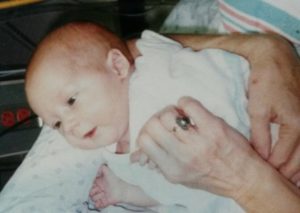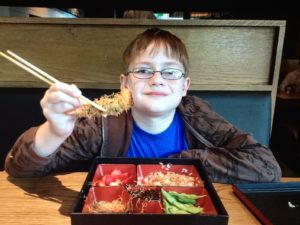Disclaimer
The following information is based solely on one family's journey through a successful multi-organ transplant of an MMIHS patient. It is not the intention of MMIHS.ORG to provide specific medical advice or recommend a course of treatment but rather to share one family's personal experience.
Due to the amount of time that has passed (2003-present) and the advances in medical technology we can not guarantee the accuracy of the information presented as it relates to current practices in medicine. MMIHS.ORG urges all readers to consult with a qualified team of medical professionals for answers to their personal medical questions and scenarios.
MMIHS & Transplants
Advances in the medical field are continually increasing the quality and longevity of the lives of those who live with MMIHS. However, there is still currently no cure and multi-organ transplants have been found to be the only definitive treatment for this syndrome thus far. Due to the severity of symptoms and numerous life threatening complications that can arise from the treatment of MMIHS, many families are faced with the possibility of a multi-organ transplant.
The following questions were generated by a group of MMIHS families and answered by the family of a multi-organ transplant recipient.
Background
 Samuel Jon Werner was born on January 4, 2000 in Austin, TX. Shortly after his birth a geneticist evaluated him and delivered the diagnosis of MMIHS. Later, a NICU doctor told us that the syndrome was usually fatal and Sam had about six months to live. He was unable to take anything by mouth the first three years of his life. 24/7 TPN. Gradually, he became sicker and sicker due to sepsis. Rotating antibiotics to address the problem was not a long-term solution so Sam was placed on the transplant list.
Samuel Jon Werner was born on January 4, 2000 in Austin, TX. Shortly after his birth a geneticist evaluated him and delivered the diagnosis of MMIHS. Later, a NICU doctor told us that the syndrome was usually fatal and Sam had about six months to live. He was unable to take anything by mouth the first three years of his life. 24/7 TPN. Gradually, he became sicker and sicker due to sepsis. Rotating antibiotics to address the problem was not a long-term solution so Sam was placed on the transplant list.
In March of 2003 (at age three), Sam underwent the 14-hour surgery. The stomach and small intestines, along with the pancreas, were transplanted. The spleen, gallbladder, and colon were removed, as they were necrotic — diseased beyond the point of function. Sam spent two months in the NICU and two additional months in a Ronald McDonald House in Pittsburgh following the transplant.

Today, Sam, at 17, is a happy, healthy, young man. He eats anything and everything, with pizza being his favorite! He takes care of his ileostomy bag himself. He self-caths three times a day. We do nothing for him medically, other than ensure that he takes his meds. He goes to school, church, the movies, and other social activities. He is currently running on his school’s cross country team.
Sam’s long-term prognosis is good. At one appointment (annual transplant follow-up) I told our doctor that I wanted Sam to outlive me. His response was, “That will happen.”
Click here to read Sam’s full story.
Before Transplant Questions
1) At what point would transplant be necessary?
 Some reasons include: sepsis, increased LFTs (liver function numbers) over an extended period of time, liver failure, failure to thrive, poor nourishment, multiple surgeries to remove portions of bowel/correct malrotations (and future anticipated surgeries), frequent emesis, or too much necrotic small bowel.
Some reasons include: sepsis, increased LFTs (liver function numbers) over an extended period of time, liver failure, failure to thrive, poor nourishment, multiple surgeries to remove portions of bowel/correct malrotations (and future anticipated surgeries), frequent emesis, or too much necrotic small bowel.
2) What is the transplant process like from start to surgery?
We actually didn't have a transplant evaluation. The process for us included only a call from our GI to Pittsburgh docs, saying that Sam was critically ill and needed a stomach/small bowel transplant. After that phone call, I received a call from Pitt's transplant coordinator; she gathered all of Sam's demographic info, insurance info, and all of our phone numbers. She said that Sam was officially on the list and to pack our bags. She said we had two choices -- to move to Pitt right then (to be ready immediately when the call came) or to stay in Austin and be able to provide immediate transportation when receiving the call. We were blessed that a member of our church owned a private plane and offered his services. So, we waited in Austin and received the call six months later. We flew to Pitt at 3:00 in the morning. When we arrived at the hospital, the process happened very quickly. Sam was rushed upstairs to be prepped for surgery, while my husband and I completed paperwork. We then joined him upstairs with barely enough time to hold him briefly. Then we waited!
3) What is the transplant review like? What tests are done?
Sam had only a motility study in Pitt in prep for the transplant. He was 8 months old. He was admitted to the hospital for three days of testing. A colonoscopy under general anesthesia was performed. As part of the colonoscopy, a colonic motility catheter was placed with the tip at the level of the transverse colon and recording sites spaced 5 cm. apart. An upper motility catheter was placed through the nose with the tip into the jejunum.
The following day, the doctor measured Sam's colonic and gastroduodenal motility. There was evidence of a significant motility disorder throughout the stomach, small bowel, and colon.
The dr. recommended a gastrostomy and a feeding jejunostomy. (Sam had already had surgery for an ileostomy.) He also mentioned the possibility of a transplant in the future.
4) What are some questions to have answered during the review?
What organs need to be listed for transplant? Do you think he/she will need a liver transplant (sometimes dr doesn't know until he/she "gets in there" and sees the liver)? Once my child is listed, how long will the wait be? What do we need to do to prep for the transplant? How long will the surgery last? How long do you anticipate recovery will take? What factors will determine how long my child is in the ICU? What Rxs will my child be on following the surgery? Is this the most optimal time for the transplant? Can we wait longer until he/she is older? Are there any options other than transplant at this time?
5) How do the doctors decide which organs will be listed?
Likely based on amount of motility in the stomach and small bowel; liver would depend on amount of disease; pancreas is attached to the small bowel, so it would be transplanted; a lot depends on lab results.
6) How do I go about selecting a transplant center?
Ask GI and parents whose kids have had transplants for a recommendation. From my research, best are Pitt, Boston, Seattle, Miami, Omaha.
7) What are the choices and how do I know which ones are good?
Ask for firsthand recommendations; google/yelp search to find out ratings of centers
8) How do I get my child listed for transplant?
Usually your GI will contact the transplant center and talk doctor to doctor (discuss medical necessity) and then a transplant coordinator will contact you.
9) How long will my child have to wait for the transplant?
Sam was on the list for six months. It varies with each child and can also depend on age and number of organs needed.
10) What are the risks/benefits of doing transplant?
 Risks: ask your GI -- he/she is your best source; Pitt did not give us a % of success. We had no choice but to do the transplant in order to save Sam's life. One risk we face is that Sam's spleen was removed because it was so necrotic. This requires lifelong medication and injections every 5 years. Having no spleen can make it harder for a person to fight off infections, although we have not found that to be the case with Sam. Benefits: if successful, no TPN/lipids, no central line, no g- or j-tube, able to eat and receive 100% of nutrition by mouth, much easier lifestyle for the entire family.
Risks: ask your GI -- he/she is your best source; Pitt did not give us a % of success. We had no choice but to do the transplant in order to save Sam's life. One risk we face is that Sam's spleen was removed because it was so necrotic. This requires lifelong medication and injections every 5 years. Having no spleen can make it harder for a person to fight off infections, although we have not found that to be the case with Sam. Benefits: if successful, no TPN/lipids, no central line, no g- or j-tube, able to eat and receive 100% of nutrition by mouth, much easier lifestyle for the entire family.
11) What is the cost and what will be covered by insurance?
Cost is several thousand dollars, however, our insurance covered the entire transplant surgery. Insurance also covered the hospitalization and the doctors' fees. Everything else was out-of-pocket, such as lodging, food, taxis/gas for car/, all “incidentals.”
12) Are there any options other than transplant?
I don't know of any options other than transplant to "cure" MMIHS. However, your GI/transplant team is your best source to answer this question.
During Transplant Questions
1) How long is the surgery? How risky is it?
Sam's surgery was 14 hours. Don't know % risk.
2) What does recovery look like and how long will we be in the hospital after transplant?
 Sam was admitted immediately to the ICU following the surgery. We were allowed to see him right away. I remember him sleeping for a long time. His team of docs came by often, as well as receiving one-on-one nursing care.
Sam was admitted immediately to the ICU following the surgery. We were allowed to see him right away. I remember him sleeping for a long time. His team of docs came by often, as well as receiving one-on-one nursing care.
He had several "thymo fevers" during his days in the ICU. These were a side effect of a drug, thymoglobulin. It is an IV drug administered only in medical settings. It's goal, along with other meds he received, is to prevent organ rejection by suppressing the body's immune response. He sustained no permanent damage from these high fevers.
He was in and out of ICU for one month, in a private room for one month, and in a Ronald McDonald house for one month. During his time in the Ronald McDonald house, we learned how to care for all of his medical needs, how/when to administer his many meds, what each one was for, etc. We took him several times a week to the hospital for outpatient check-ups, which included training from a nurse in his daily care. So, all together, we stayed in Pitt for approximately three months following the surgery before he was discharged.
Upon arrival in Austin, we were "on our own" in terms of Sam's care. But, the only things we had to do were to hang one bag of hydration per day, administer meds, and cath about four times per day. We took him to our local GI twice a month. After six months, his central line was pulled and the hydration stopped. Also, the number of meds he had to take was significantly decreased. His care was relatively easy as compared to before the transplant.
After Transplant Questions
1. What are the life-long issues or management post- transplant?
Management following transplant is significantly simpler than before transplant. We had no issues with Sam regarding oral aversion (even though he had nothing by mouth for the first three years of his life). So, in terms of feeding him, he started out with liquids and soft foods in the hospital. After arriving home, he progressed to solids – we offered him one Cheerio at a time! – gradually increasing texture and amount of food. Within three months, he was tolerating a normal diet.
Sam retained his central line for six months following discharge from the hospital. We gave him one bag of hydration per day. The only appliance he had was his ileostomy bag. We emptied and changed it as needed. He also required catheterization three times per day.
2. What are the types of therapies involved post-transplant?
Sam did not receive any therapy post- transplant.
3. What is the medication list like post-transplant?
Sam came home from the hospital on approximately ten meds – mainly anti-rejection and antibiotics. Over time, his meds were reduced to the three he takes today – prograf, Bactrim, and penicillin.
4. How often are appointments scheduled post-transplant?
Sam’s medical routine today consists of labs every three months and a few doctor visits a year: one with his GI, one with the transplant surgeon, one with the urologist, and one with an Infectious Disease doctor. From this doctor, he receives injections every five years – pneumococcal and meningococcal vaccines due to his immunosuppression and the fact that he doesn’t have a spleen.
5. Will my child have a “normal life” after transplant and/or what things will they still deal with?
 Because Sam is immunosuppressed, there are possible future complications (this is due to the prograf that he takes). He is more susceptible to infections/illnesses such as viruses, bacterial infections, the flu, etc. If he catches something, it may take him longer to fight it off. However, Sam has had only one bacterial infection/illness since his transplant – RSV when he was ten years old, which was successfully treated after a six-day hospitalization.
Because Sam is immunosuppressed, there are possible future complications (this is due to the prograf that he takes). He is more susceptible to infections/illnesses such as viruses, bacterial infections, the flu, etc. If he catches something, it may take him longer to fight it off. However, Sam has had only one bacterial infection/illness since his transplant – RSV when he was ten years old, which was successfully treated after a six-day hospitalization.
 Today, Sam, at 17, is a happy, healthy young man. I asked him about this question, and he said, “ Yes, my life is normal.” He eats anything and everything, with pizza being his favorite! He takes care of his ileostomy bag himself. He self-caths three times a day. We do nothing for him medically, other than ensure that he takes his meds twice daily. He goes to school, church, the movies, and other social activities. He is currently running on his school’s cross country team. He also takes piano lessons and plays for church and a local retirement center.
Today, Sam, at 17, is a happy, healthy young man. I asked him about this question, and he said, “ Yes, my life is normal.” He eats anything and everything, with pizza being his favorite! He takes care of his ileostomy bag himself. He self-caths three times a day. We do nothing for him medically, other than ensure that he takes his meds twice daily. He goes to school, church, the movies, and other social activities. He is currently running on his school’s cross country team. He also takes piano lessons and plays for church and a local retirement center.
Our family life today is so much easier and more pleasant than before the transplant. We are so glad he had the transplant, and blessed that it was successful.